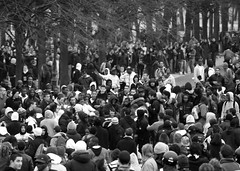Gandhi was often jailed for sedition. What was this crime?
Sedition is a term of law to refer to covert conduct such as speech and organization that is deemed by the legal authority as tending toward insurrection against the established order. Sedition often included subversion of a constitution and incitement of discontent (or resistance) to lawful authority. Sedition may include any commotion, though not aimed at direct and open violence against the laws, says Wikipedia.
The difference between sedition and treason consists primarily in the subjective ultimate object of the violation to the public peace. Sedition does not consist of levying war against a government nor of adhering to its enemies, giving enemies aid, and giving enemies comfort. Nor does it consist, in most representative democracies, of peaceful protest against a government, nor of attempting to change the government by democratic means (such as direct democracy or constitutional convention).
skip to main |
skip to sidebar
For students and parents who love education and exploration of the social sciences . . .
Search This Blog
Followers
Blog Archive
-
▼
2006
(381)
-
▼
November
(34)
- The Peace Symbol originated in Britain during the ...
- What happened to the US in Vietnam: an essay due T...
- A laptop for Christmas? I recommend it for your st...
- Class of 2010 talent Show
- The significant stimulation of a tiny shot of espr...
- The global peregrinations of the potable known as ...
- 5 presidents timeline project to be followed by Ve...
- Soldier interview: it is history and you are a his...
- Viet vet interview: substituting a Korean War vet ...
- Vietnam is cool: Jolie & Pitt jazz around Ho Chi M...
- Five Presidents, the Cold War and Vietnam
- Viet map project: All eyes on 'Nam, 1950 - 1975
- Why photos of Vietnam soldiers look the way they d...
- test post
- Questions for Vietnam Veteran Interview Project - ...
- Vietnam map & open notes quiz Fri, Nov 17
- Indochina was the name for the nations of South Ea...
- India once had many diamond mines and also mined s...
- Traditional entertainment of India: a snake charmer
- Guerilla warfare as practiced by Ho Chi Minh's tro...
- Modern Girl in Ho Chi Minh City (formerly Saigon)
- Cambodia - the Angkor Wat temple complex
- Vietnam & Southeast Asia & the US Conflict
- Class of 2010 Talent Show tryouts Th, Nov 16, Mon,...
- Digital presentations worked on in thhe newly refu...
- Apathy came up in class in regards Gandhi
- Protest - when does it become sedition? Answer: ...
- Gangway for Gandhi! Second stop, London
- Nihang Singh, holy man of the region along the Pak...
- Tandoori Chicken, an item from Indian cuisine that...
- Week Nov 6 - 11: project on Indian studies due Thu...
- Leadbelly one of North Louisiana's most famous per...
- Ganesha, one of the more popular gods of Hinduism ...
- An overview of the life of MK Gandhi
-
▼
November
(34)

